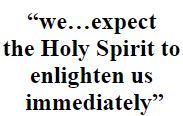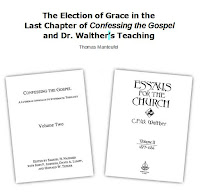This continues from Part 1, a 3-part series on the importance of Holy Scripture in Walther's theology. — To reinforce Walther's acceptance of the label "Biblicism", we add the following striking assertion that will put all modern theologians on the defensive. The importance of the Scripture Principle, or the "formal principle", or "das Schriftprinzip", was severely compromised by all modern theology, even in Walther's day. But in the Synodical Conference Report of 1886 it was stated (p. 29-30, emphasis mine):
“Hence, we stand by our thesis, ‘the doctrine, that the Holy Scriptures of the Old and New Testaments are of divine origin in their contents and wording, is a doctrine the surrender of which dissolves the foundation of the Christian faith.’ Those who speak like Volck, Harnack, and others no longer stand in faith.”
Did you hear that? Let me repeat it: Walther and the Synodical Conference declare that a compromise of the divine Inspiration of Holy Scripture “dissolves the foundation of the Christian faith”, that those who deny it
“no longer stand in faith”.
This is a very serious warning indeed! It flatly states that one cannot hold the so-called "material principle", i.e. "justification through faith" or the "vicarious satisfaction", without the Scripture Principle. Long before Franz Pieper rose to the head of Concordia Seminary, C.F.W. Walther passionately taught this and defended it for dear life.
It is a pattern in Pieper's "Das Fundament" essay to point out that deniers of this doctrine are actually abandoning the foundations of Christianity, a very serious charge, and one that he (and Walther and Luther) meant. These warnings are no child's play, they are no joke, nothing funny – they are matters of spiritual and eternal life and death – for you and me. — In the next installment of Pieper's Das Fundament series, Part 20, this great warning is repeated. — In the concluding Part 3 of this series, examples are given of false charges made by LCMS teachers against Franz Pieper.
- - - - - - [Further information on Engelder's review of Werner Elert in the Read More section below] - - - - - -
 |
| Engelder praised Werner Elert, only weak warning |
Theo. Engelder defended the Scripture Principle quite strongly with his final book The Scripture Cannot Be Broken. He was subsequently disdained for this by teachers in the LC-MS. However, in a 1937 review of an essay by the German theologian Werner Elert (CTM 8, October, p. 738-740, PDF, “Schrift und Bekenntnis”), Engelder praised Elert's "confessional" theology while partially admitting Elert's confusing talk of "Scriptural authority". One would have a hard time finding Walther or Pieper offering any praise of theologians, German or American, who question the full divinity of Holy Scripture. As demonstrated above, they rather question that they even stand in the Christian faith. Unfortunately Engelder's weak warnings against Elert may have been used by the changing LC-MS as a green light to then take their instruction from Germany, instead of from Walther and Pieper. (See Schroeder, here, p. 234)
 Lowell C. Green in his 1997 (Summer) essay for CHIQ "The Relationship of Werner Elert and America" p. 83, stated the following influence of Elert on the LC-MS:
Lowell C. Green in his 1997 (Summer) essay for CHIQ "The Relationship of Werner Elert and America" p. 83, stated the following influence of Elert on the LC-MS:
 Lowell C. Green in his 1997 (Summer) essay for CHIQ "The Relationship of Werner Elert and America" p. 83, stated the following influence of Elert on the LC-MS:
Lowell C. Green in his 1997 (Summer) essay for CHIQ "The Relationship of Werner Elert and America" p. 83, stated the following influence of Elert on the LC-MS:"…some of the Americans who according to my knowledge studied at Erlangen [under Elert] in the 1930s include Helmut Lehmann and Martin Lehmann, Fred Schoenbohm, Dorris Flessner, Martin Dietrich, Theodore Bachmann, and Theodore Baudler; in the 1940s and 50s followed Norman Nagel, Robert Schultz, Edward Schroeder, Richard Baepler, Paul Schulze, Lloyd Svendsbye, Howard Wagner, Robert Foster, and I. Besides these, Germans who studied under Elert and later became prominent in America included Gottfried Krodel, Gerhard Krodel, and Hans Hillerbrand. Elert also exerted his influence on Americans who did not study directly under him, such as Reu, Samuel Salzmann, Berthold von Schenck, and Jaroslav Pelikan, to name only a few."Today's LC-MS and American Lutheranism in general are much more a product of Werner Elert than Engelder, Walther, or Franz Pieper. [Full German text of Engelder's review from CTM p. 736-747 here; translation of only the review of Elert's essay p. 738-740 here.] [2020-02-03: inserted the text of the aforementioned translation below in the "jump break" section:]
















